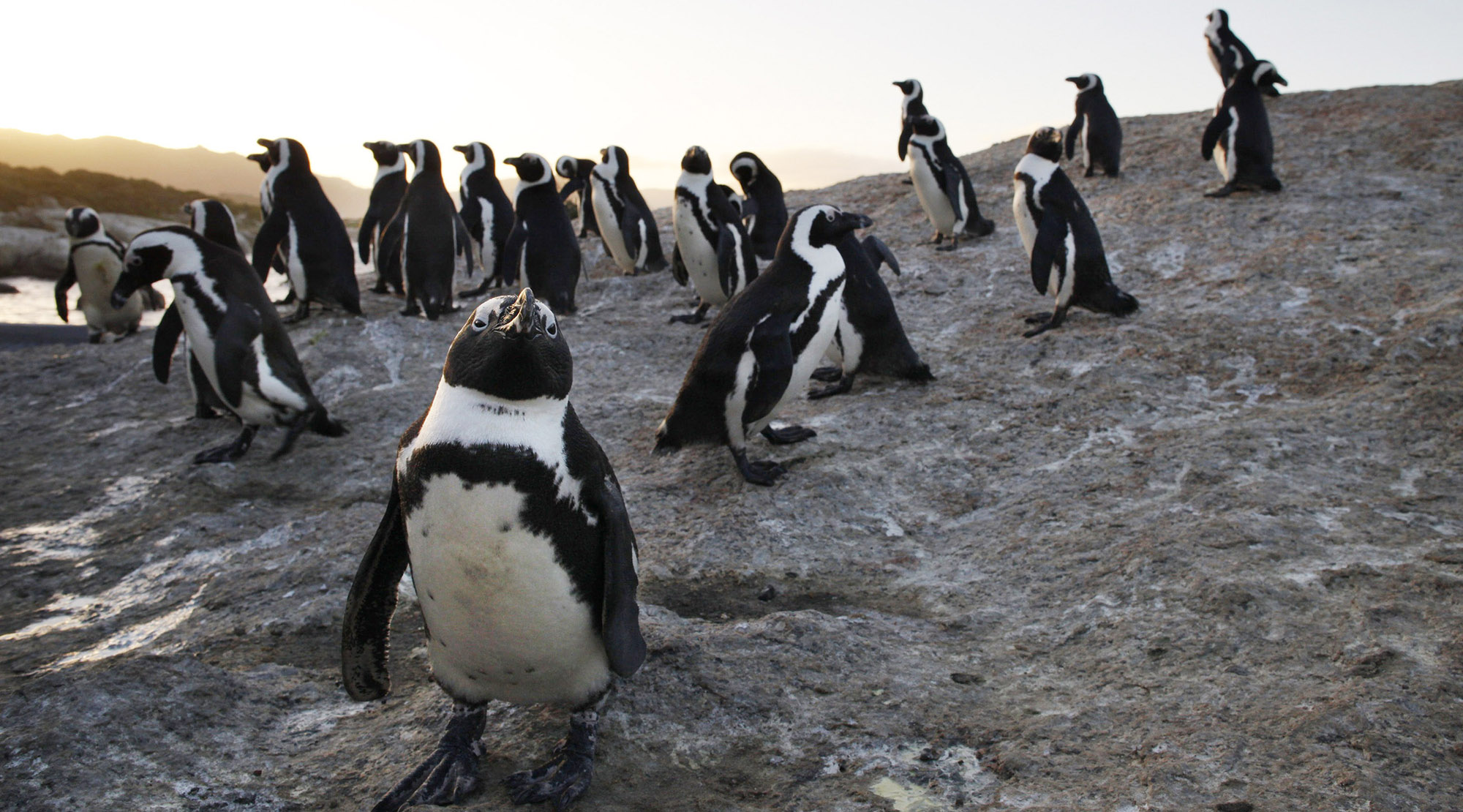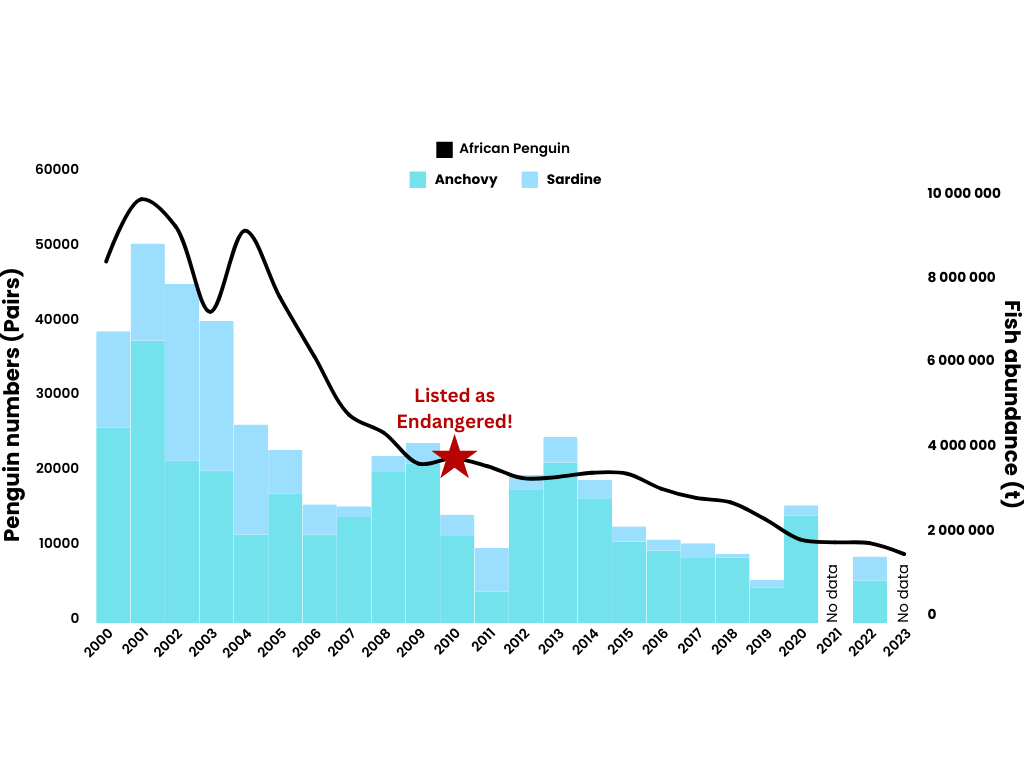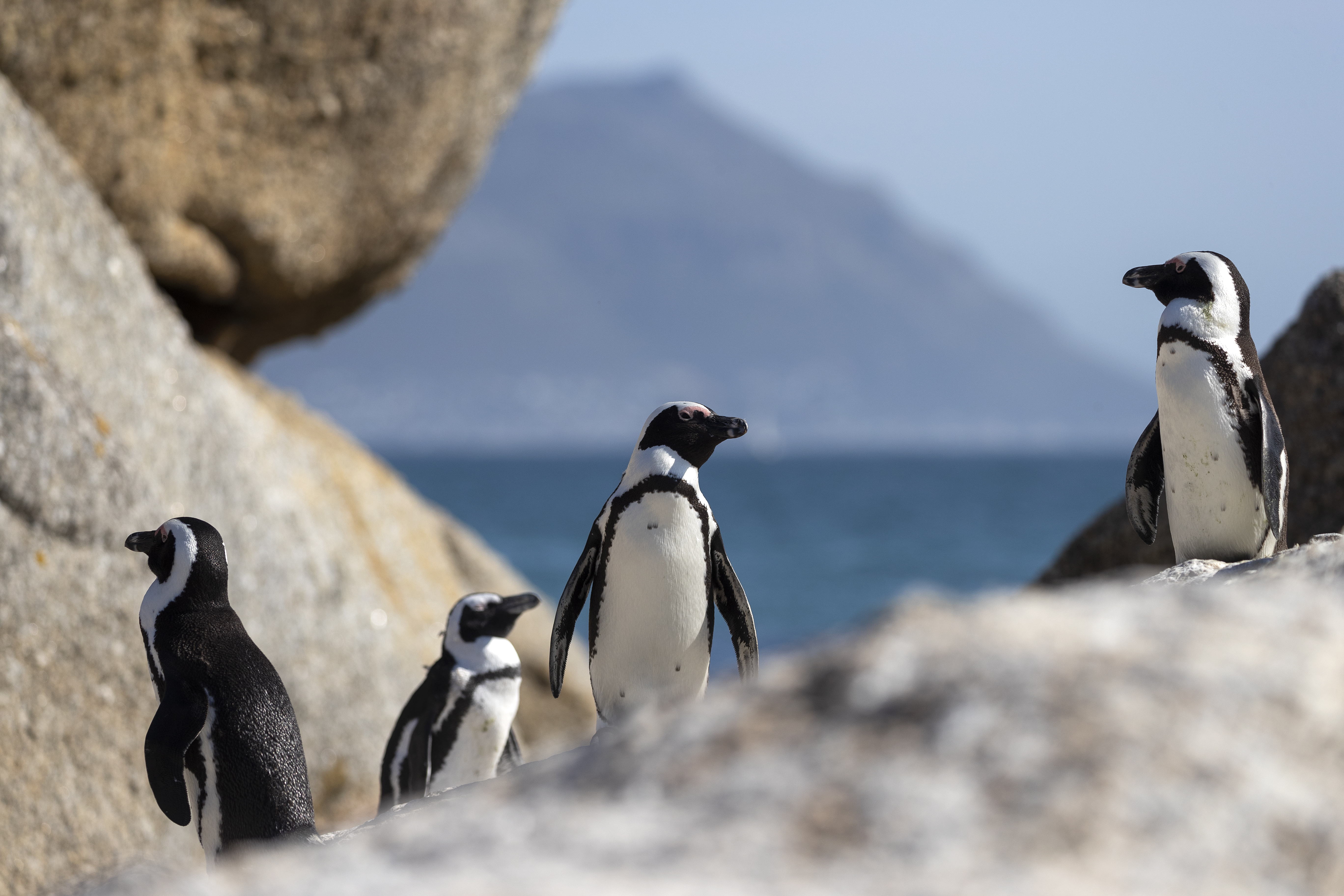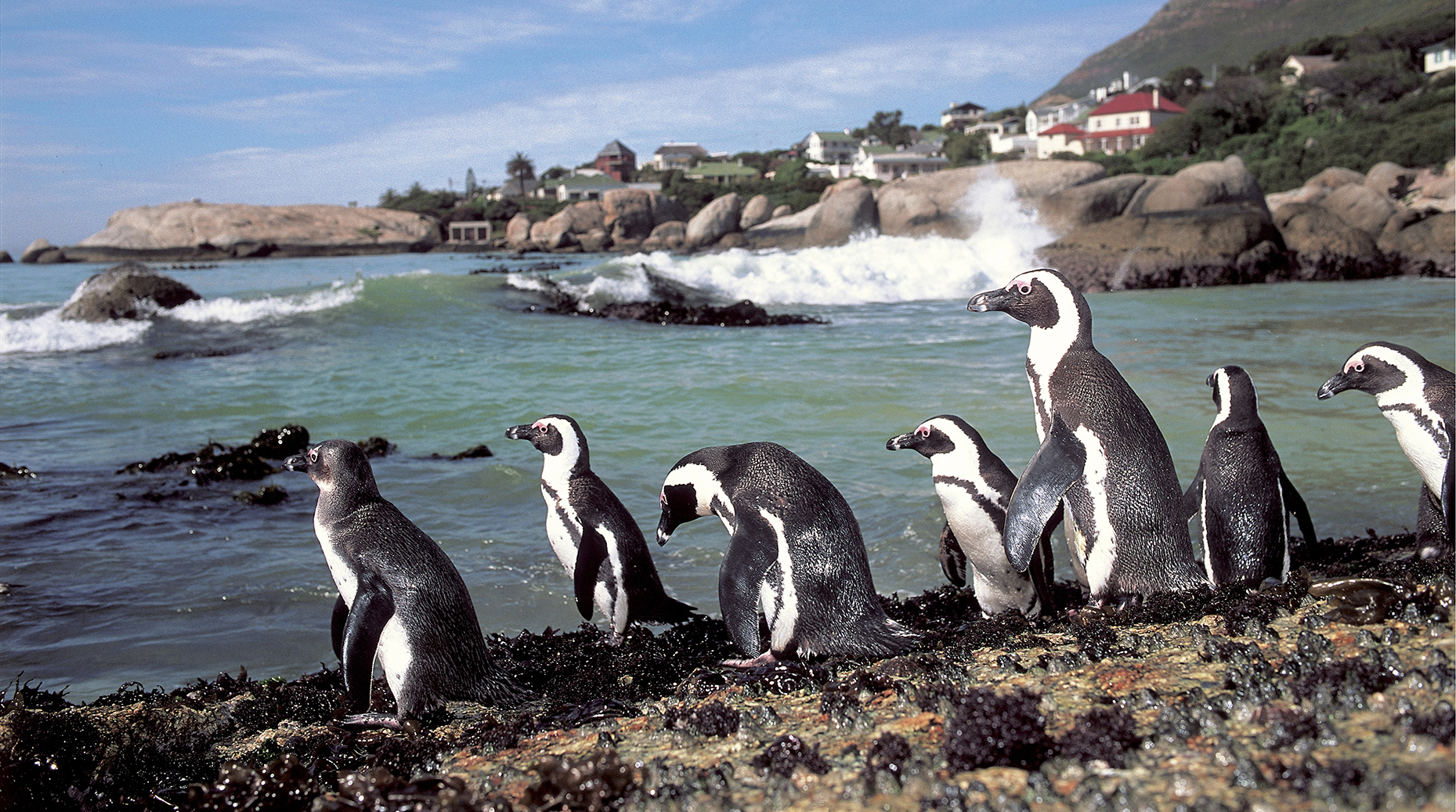Who doesn’t love penguins? Whether you’ve been lucky enough to have an in-penguin encounter at Boulders Beach or simply enjoyed their cuteness in iconic movies like Surf’s Up or Happy Feet, it’s difficult to imagine a world without penguins.
But, if things don’t change soon, such a world could be a reality in as little as 12 years as the African penguin (Spheniscus demersus) teeters on the brink of extinction.
This doesn’t mean that you, your children or your grandchildren will never see an African penguin. There are likely to still be penguins, stuffed behind glass in museums or captive in zoos and aquariums – with perhaps a few remaining in rehabilitation centres.
 African penguins gather at the end of the day at Boulders Beach in Simon’s Town. (Photo: Paula Bronstein / Getty Images)
African penguins gather at the end of the day at Boulders Beach in Simon’s Town. (Photo: Paula Bronstein / Getty Images)
Missing from our seascape, though, will be colonies of wild African penguins living and thriving in our oceans and on our shorelines and islands.
The route to extinction
The African penguin is endemic to South Africa and Namibia: it is Africa’s only penguin, occurring nowhere else on earth.
Yet it is listed as “Endangered” by the International Union for Conservation of Nature (IUCN) on its Red List of Threatened Species.
This status is all the more alarming when one considers that this species was once among South Africa’s most ubiquitous seabirds, estimated to number up to three million individuals at the turn of the 20th century.
More recently, and in just 30 years, the number of breeding pairs has declined by a staggering 77%.
Today, only 9,900 breeding pairs remain globally, of which 86% occur in South Africa.
It’s hard for us to comprehend that, although African penguins have graced southern African waters for about 300,000 years – during which they have evolved, survived and adapted – their future is now uncertain.
 (Source: Christina Hagen (BirdLife South Africa), with data from the Department of Forestry, Fisheries and the Environment)
(Source: Christina Hagen (BirdLife South Africa), with data from the Department of Forestry, Fisheries and the Environment)
How we got here
Due to the numerous threats, both historical and current, it is difficult to pin the decline in numbers of African penguins to a single cause.
African penguins are colonial breeding birds. While they spend time at sea, they also spend a considerable amount of time on land while breeding and during the annual moult.
During their moult they are land-bound for two to three weeks and therefore need to acquire sufficient fat reserves to sustain them during this period, which means they need to spend the preceding four to five weeks foraging at sea.
When they have completed their moult, they need to regain lost reserves and build muscle to hunt efficiently.
Given their specialised feeding habits, a sustainable supply of sardines and anchovies is vital for their survival.
Through many years of research findings, we have been aware that the primary driver of the decline in penguin numbers is a shortage of food, as “food scarcity reduced the populations of several species that compete with fisheries for prey and was largely responsible for the recent collapse of penguins in South Africa.”
African penguins compete for sardines and anchovies with the purse-seine fishing industry, so called because the net used for catching these fish is circled around a school and then pulled tight, like the drawstring of a purse.
This is the largest industrial fishery in South Africa in terms of landed mass, and competition with seabirds is exacerbated by the current low abundance of both these fish.
The sardine catch is either canned or packaged as bait, whereas anchovies are reduced to fishmeal and oil and either exported or used by the agricultural sector. Due to declining stocks off our coast, most of the sardines you see on supermarket shelves in South Africa are imported from Morocco.
 African penguins at Boulders Beach in Simon’s Town. (Photo: EPA-EFE / Nic Bothma)
African penguins at Boulders Beach in Simon’s Town. (Photo: EPA-EFE / Nic Bothma)
Undernourished penguins are less resilient to other threats. These include underwater noise disturbance from increased shipping traffic and seismic surveys, predation by sharks and seals, and an emerging threat that has affected seabirds globally – disease outbreaks, namely the Highly Pathogenic Avian Influenza Virus.
In recent years, there has also been an increase in oiled marine birds, particularly in Algoa Bay.
Oil spills are occurring more frequently with the increase in ships fuelling at sea in a practice known as ship-to-ship bunkering, permitted to operate just a few kilometres from St Croix Island in Algoa Bay.
Where to now?
People can do their bit to help the African penguin by paying fees to enter marine reserves, or by making donations to marine and seabird conservation organisations.
However, addressing the main threats to the survival of South Africa’s shore-based and island colonies requires drastic and strategic government-led interventions before time runs out.
On 4 August 2023, the Department of Forestry, Fisheries and the Environment endorsed no-take zones (also referred to as “island closures”), prohibiting commercial purse-seine fishing in waters around six of the seven largest African penguin colonies.
We welcomed Minister Barbara Creecy’s announcement that the no-take zones would be implemented for 10 years. Her decision was informed by an international review panel comprising economists and seabird and fishery scientists, with the aim of evaluating contradictory findings about the benefits of no-take zones.
However, and notwithstanding the guidance provided by the expert panel as to how the no-take zones should be configured, the minister sent the industry and conservation scientists back to the negotiating table.
In doing so, the minister’s decision fell short in respect of the arbiter role of the independent expert panel, particularly given the long-standing impasse between the conservation scientists and fishery scientists.
To quote from the minister’s announcement, “If there is agreement on fishing limitations over the next few weeks or months across these sectors, these will be implemented as they are agreed upon. If no alternate fishing limitation proposals are concluded by the start of the 2024 Small Pelagic Fishing Season (15 January 2024), the current interim fishing limitations will continue until the end of the 2033 fishing season…”
Despite pleas by the conservation sector for the realignment of the boundaries of the no-take zones to cover the core foraging areas for African penguins, consensus has not been reached.
Consequently, the so-called “interim” closures, in place while the expert panel did its assessment, will now remain until the end of the 2033 fishing season. By this time the fate of the African penguin will be all but decided.
So what?
BirdLife South Africa and Sanccob appreciate the socioeconomic contribution of the industry. The call, however, is for sensible trade-offs whereby no-take zones are designed to benefit penguins while ensuring the industry remains viable.
The need for a trade-off speaks directly to the precautionary principle, a global norm for decisions about the environment and set down in section 2 of South Africa’s National Environmental Management Act.
Hence, lack of full scientific certainty should not be used as a reason for postponing cost-effective measures to prevent serious and irreversible consequences.
We, as CEOs of bird conservation organisations, would be implicated in the penguins’ fate if we failed to challenge decisions that will push the species closer to the extinction precipice.
African penguins are not magically disappearing – they are being pushed to the brink by human pressure on their food supply and habitats. There is a fast-shrinking window of opportunity to save this species.
Taking the minister to court over the decision to implement suboptimal island closures is a last resort that has not been taken lightly by our organisations.
However, we believe it is a necessary measure to save the last remaining African penguins.
Preventing this species’ extinction is imperative, not just from an ethical perspective but because it is essential to maintaining the health of our marine environment.
The African penguin is the canary in the proverbial (marine) coal mine and its decline tells us that our oceans are not in great shape, and other, perhaps less charismatic and less studied species are probably in a similar dire position.
If we don’t seize every available opportunity and act now, the fate of the African penguin is as good as signed and sealed. DM
Mark D Anderson is CEO of BirdLife South Africa, an internationally renowned organisation which focuses its work on conserving threatened bird species and important bird habitats. BirdLife SA has three staff members who are dedicated African penguin scientists and conservationists.
Natalie Maskell is CEO of the Southern African Foundation for the Conservation of Coastal Birds (Sanccob), a non-profit organisation that carries out and leads vital conservation initiatives to reverse the decline of southern African seabird populations in the wild, with special focus on endangered species like the African penguin.




 African penguins at Boulders Beach in Simon’s Town. (Photo: EPA-EFE / Nic Bothma)
African penguins at Boulders Beach in Simon’s Town. (Photo: EPA-EFE / Nic Bothma)